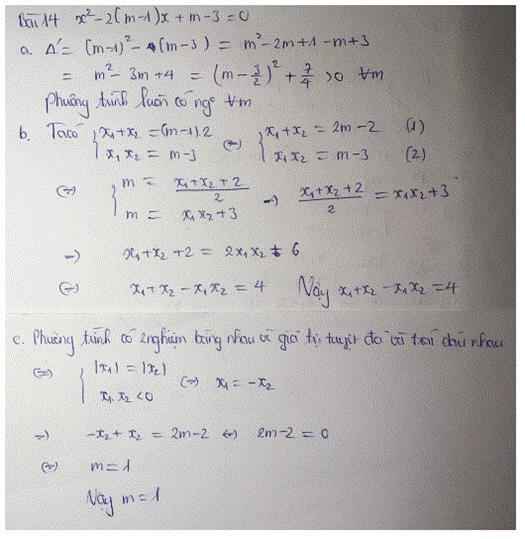Hãy nhập câu hỏi của bạn vào đây, nếu là tài khoản VIP, bạn sẽ được ưu tiên trả lời.

c: Thay m=-2 vào pt, ta được:
\(x^2-2x+1=0\)
hay x=1
f: Thay x=-3 vào pt, ta được:
\(9-3m+m+3=0\)
=>-2m+12=0
hay m=6

a) Thay m=1 vào phương trình, ta được:
\(x^4-4x^2-5=0\)
\(\Leftrightarrow x^4+x^2-5x^2-5=0\)
\(\Leftrightarrow x^2\left(x^2+1\right)-5\left(x^2+1\right)=0\)
\(\Leftrightarrow\left(x^2+1\right)\left(x^2-5\right)=0\)
mà \(x^2+1>0\forall x\)
nên \(x^2-5=0\)
\(\Leftrightarrow x^2=5\)
hay \(x\in\left\{\sqrt{5};-\sqrt{5}\right\}\)
Vậy: Khi m=1 thì tập nghiệm của phương trình là: \(S=\left\{\sqrt{5};-\sqrt{5}\right\}\)

1. Với m = -1
Phương trình đã cho trở thành x2 + 2x - 3 = 0
Dễ thấy phương trình có a + b + c = 0 nên có hai nghiệm phân biệt x1 = 1 ; x2 = c/a = -3
Vậy ...
2. a) Để phương trình có hai nghiệm phân biệt thì Δ' > 0
=> 1 - ( 4m + 1 ) > 0
<=> 1 - 4m - 1 > 0 <=> m < 0
b) Theo hệ thức Viète ta có : \(\hept{\begin{cases}x_1+x_2=-\frac{b}{a}=-2\\x_1x_2=\frac{c}{a}=4m+1\end{cases}}\)
Để phương trình có hai nghiệm trái dấu thì x1x2 < 0 <=> 4m + 1 < 0 <=> m < -1/4
c) x12 + x22 = 11 <=> ( x1 + x2 )2 - 2x1x2 = 11
<=> 4 - 2( 4m + 1 ) = 11
<=> -8m - 2 = 7
<=> m = -9/8

a: \(\text{Δ}=\left(2m-1\right)^2-4\left(m-1\right)\)
\(=4m^2-4m+1-4m+4=4m^2-8m+5\)
\(=\left(4m^2-8m+4\right)+5=4\left(m-1\right)^2+5>0\)
=>Phương trình luôn có hai nghiệm phân biệt
b: Để phương trình có hai nghiệm trái dấu thì m-1<0
hay m<1

1.Ta có \(\Delta=4m^2-4\left(m^2-m-3\right)=4m+12\)
Để phương trình có 2 nghiệm phân biệt \(\Rightarrow\Delta>0\Rightarrow4m+12>0\Rightarrow m>-3\)
Theo hệ thức Viet ta có \(\hept{\begin{cases}x_1+x_2=2m\\x_1.x_2=m^2-m-3\end{cases}}\)
a. Phương trình có 2 nghiệm trái dấu \(\Rightarrow x_1.x_2< 0\Rightarrow m^2-m-3< 0\Rightarrow\frac{1-\sqrt{13}}{2}< m< \frac{1+\sqrt{13}}{2}\)
Vậy \(\frac{1-\sqrt{13}}{2}< m< \frac{1+\sqrt{13}}{2}\)
b. Phương trình có 2 nghiệm phân biệt dương \(\Leftrightarrow\hept{\begin{cases}x_1+x_2=2m>0\\x_1.x_2=m^2-m-3>0\end{cases}\Leftrightarrow\hept{\begin{cases}m>0\\m< \frac{1-\sqrt{13}}{2}\end{cases}\left(l\right);\hept{\begin{cases}m>0\\m>\frac{1+\sqrt{13}}{2}\end{cases}\Leftrightarrow m>\frac{1+\sqrt{13}}{2}}}}\)
Vậy \(m>\frac{1+\sqrt{13}}{2}\)
2. a.Ta có \(\Delta=\left(2m-1\right)^2+4m=4m^2-4m+1+4m=4m^2+1\)
Ta thấy \(\Delta=4m^2+1>0\forall m\)
Vậy phương trình luôn có 2 nghiejm phân biệt với mọi m
b. Theo hệ thức Viet ta có \(\hept{\begin{cases}x_1+x_2=1-2m\\x_1.x_2=-m\end{cases}}\)
Để \(x_1-x_2=1\Leftrightarrow\left(x_1-x_2\right)^2=1\Leftrightarrow\left(x_1+x2\right)^2-4x_1x_2=1\)
\(\Leftrightarrow\left(1-2m\right)^2-4.\left(-m\right)=1\Leftrightarrow4m^2-4m+1+4m=1\)
\(\Leftrightarrow m^2=0\Leftrightarrow m=0\)
Vậy \(m=0\)thoă mãn yêu cầu bài toán

Với \(m\ne1\):
a. \(\Delta'=m^2-\left(m-1\right)\left(m+1\right)=1>0\Rightarrow\) pt luôn có 2 nghiệm pb khi \(m\ne1\)
b. Theo hệ thức Viet: \(x_1x_2=\dfrac{m+1}{m-1}\)
\(\Rightarrow\dfrac{m+1}{m-1}=5\Rightarrow m=\dfrac{3}{2}\)
Khi đó: \(x_1+x_2=\dfrac{2m}{m-1}=\dfrac{2.\dfrac{3}{2}}{\dfrac{3}{2}-1}=6\)
c. \(\left\{{}\begin{matrix}x_1+x_2=\dfrac{2m}{m-1}\\x_1x_2=\dfrac{m+1}{m-1}\end{matrix}\right.\) \(\Leftrightarrow\left\{{}\begin{matrix}x_1+x_2=2+\dfrac{2}{m-1}\\x_1x_2=1+\dfrac{2}{m-1}\end{matrix}\right.\)
\(\Rightarrow x_1+x_2-x_1x_2=1\)
Đây là hệ thức liên hệ 2 nghiệm ko phụ thuộc m
d. \(\dfrac{x_1}{x_2}+\dfrac{x_2}{x_1}+\dfrac{5}{2}=0\Leftrightarrow\dfrac{x_1^2+x_2^2}{x_1x_2}+\dfrac{5}{2}=0\)
\(\Leftrightarrow\left(x_1+x_2\right)^2+\dfrac{1}{2}x_1x_2=0\)
\(\Leftrightarrow\dfrac{4m^2}{\left(m-1\right)^2}+\dfrac{m+1}{2\left(m-1\right)}=0\)
\(\Leftrightarrow8m^2+\left(m^2-1\right)=0\)
\(\Leftrightarrow m^2=\dfrac{1}{9}\Rightarrow m=\pm\dfrac{1}{3}\)

b, Để phương trình có 2 nghiệm \(\Delta\ge0\)
hay \(\left(2m+8\right)^2-4.m^2=4m^2+32m+64-4m^2=32m+64\ge0\)
\(\Leftrightarrow32m\ge64\Leftrightarrow m\ge2\)
Theo Vi et ta có : \(\left\{{}\begin{matrix}x_1+x_2=-\dfrac{b}{a}=2m+8\\x_1x_2=\dfrac{c}{a}=m^2\end{matrix}\right.\)
mà \(\left(x_1+x_2\right)^2=4m^2+32m+64\Rightarrow x_1^2+x_2^2=4m^2+32m+64-2x_1x_2\)
\(=4m^2+32m+64-2m^2=2m^2+32m+64\)
Lại có : \(x_1^2+x_2^2=-2\)hay \(2m^2+32m+66=0\Leftrightarrow m=-8+\sqrt{31}\left(ktm\right);m=-8-\sqrt{31}\left(ktm\right)\)
a) Thay m=8 vào phương trình, ta được:
\(x^2-2\cdot\left(8+4\right)x+8^2=0\)
\(\Leftrightarrow x^2-24x+64=0\)
\(\text{Δ}=\left(-24\right)^2-4\cdot1\cdot64=576-256=320\)
Vì Δ>0 nên phương trình có hai nghiệm phân biệt là:
\(\left\{{}\begin{matrix}x_1=\dfrac{24+8\sqrt{5}}{2}=12+4\sqrt{5}\\x_2=\dfrac{24-8\sqrt{5}}{2}=12-4\sqrt{5}\end{matrix}\right.\)
Vậy: Khi m=8 thì phương trình có hai nghiệm phân biệt là \(x_1=12+4\sqrt{5};x_2=12-4\sqrt{5}\)

Giải hộ e bài này vs ạ mọi ng